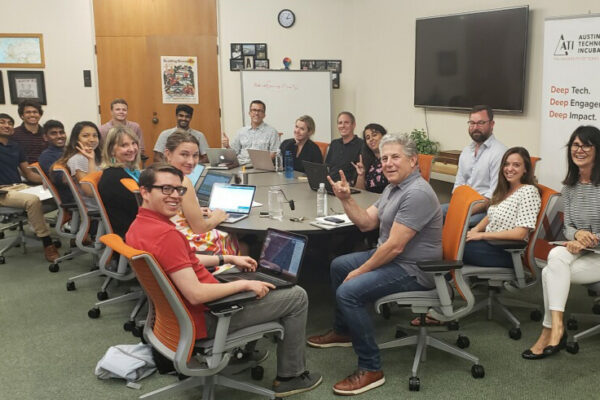What starts at The University of Texas at Austin changes the world — and Austin has certainly changed over the past several decades, with a growing population and economy. The city is being called a new tech startup hub, but some may not know that the longest active tech incubator in the United States is UT’s Austin Technology Incubator (ATI).
Founded in 1989 by George Kozmetsky, former dean of the McCombs School of Business who also founded UT’s IC² Institute, ATI has played a key role in advancing entrepreneurship and innovation in Austin. ATI’s dual purpose is to serve the university as an education and research laboratory for entrepreneurship and technology venturing, and to serve as a regional catalyst for economic development.
“It’s an incredible learning lab for students,” says Erin Keys, ATI’s director of sustainability.
Through a formal application process, entrepreneurs from all over the globe interested in partnering with ATI are initially assessed by UT students including McCombs MBA candidates, giving them the opportunity to see firsthand what makes a good business, market and team. Companies that are selected are reviewed by a “success committee” made up of industry experts, who assess their potential and whether ATI can adequately assist their business.
Companies currently partnering with ATI include Nephrodite, which is developing a hemodialysis device for patients with end-stage kidney disease; Herdsy, which uses livestock collar technology to advance financial and environmental sustainability; and Big Wheelbarrow, a supply chain platform that works with buyers and sellers to consolidate inventory and provide food for restaurants and grocery stores.
Sam Eder, CEO of Big Wheelbarrow, says that ATI has significantly helped his organization continue its operations.
“They bring us the ability to work with interns and really smart outside resources that they’ve identified to bring into the program. It’s been incredible for us. We can pretty much count every day on something that ATI has had an influence on,” Eder says.
ATI student associate Abhishek Dasgupta, who graduated in May with a degree in biomedical engineering, has worked for the past two years providing strategic guidance to ATI member companies including re:3D, a 3D printing company that produces large objects at an accurate scale, and Environmental Quality Operations (EQO), which monitors aquatic species such as zebra mussels, whose infestations make local water unsafe to drink. EQO provides early detection services to preserve water sources.
Dasgupta also organized ATI’s Austin Food Cluster, conducting outreach with local food companies. This experience resulted in solutions that will benefit dozens of businesses as well as local communities.
“We saw all these organizations having similar missions, but not collaborating or not being able to synergize in a way that would streamline each of their processes. Together, Erin and I were able to shape an innovation hub around food,” he says.
ATI received an award from the Wells Fargo Innovation Incubator (IN2), whose mission is supporting early-stage, clean-technology entrepreneurs. With this award, ATI has been able to create relationships with nearly 50 food and agriculture-related organizations, including Big Wheelbarrow, that will now be included in TexasRealFood (TRF), a directory platform that enables engagement with the state’s food and agriculture ecosystem for the average consumer.
TRF promotes local farms and ranches, artisan food producers, sustainable and/or farm-to-table restaurants, butchers, breweries, vineyards and more. TRF is committed to building a more ecologically sound, economically resilient food system based on the values of local communities.
“The goal is to empower the businesses in our communities to build relationships directly with the consumers who support them and vice versa,” says Sebastian Sauerborn, founder and CEO of TexasRealFood. “The integration of ATI’s Austin Food Cluster is a key factor in taking the next step to furthering innovation in Texas’ agriculture and food and beverage industries for a more sustainable future.”
TRF is incorporating data from the Austin Food Cluster project into its website to create a larger “business resources hub” aimed at supporting small to midsize businesses through every stage of development.
Dasgupta says that while working at ATI on projects like Austin Food Cluster, he was encouraged to pursue his interests and push himself. He adds that his ATI experience has been one of the highlights of his college career. He is grateful for the mentorship and feedback he has received, often feeling like a peer rather than a student.
“ATI is a portal into the real world. I got to work with real business owners who are part of the Central Texas ecosystem,” he says. “ATI has continuously reshaped my understanding of what is possible through entrepreneurship and innovation — and has given me unparalleled experience.”




